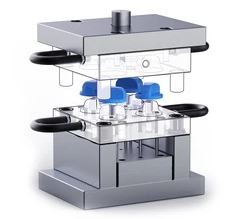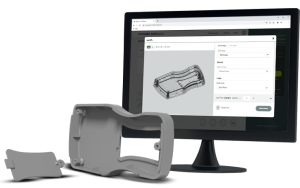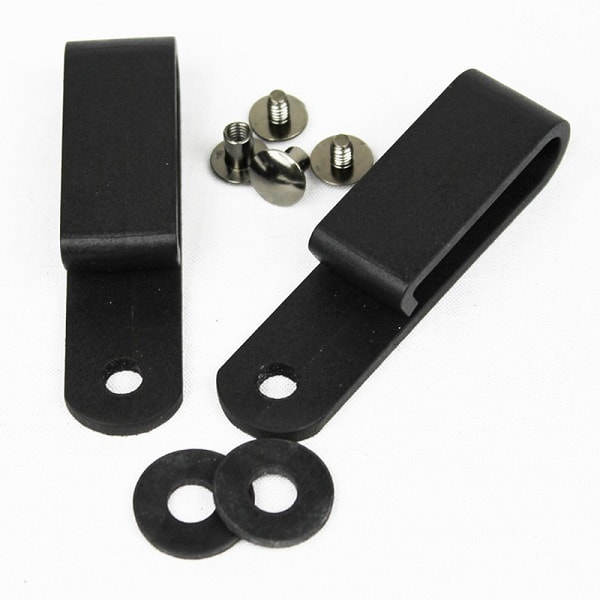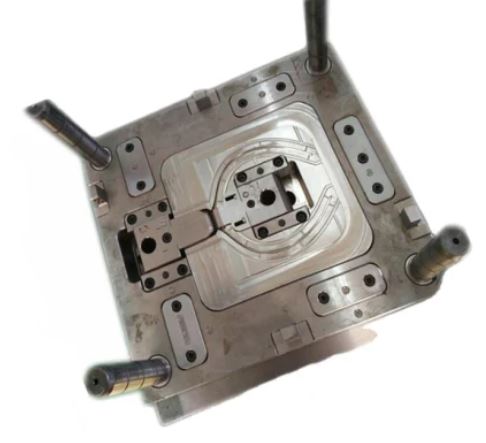“Since there are many injection molding materials, understanding their nuances is essential to obtain the desired result. Choosing the right molding material ensures the final product’s functionality and aligns with economic and environmental goals.”
Injection molding is used in diverse industries, from automotive to consumer goods. One of the prime reasons for its popularity is that different materials are compatible with this accurate technology. Furthermore, selecting the right injection molding material influences the final product’s physical properties (strength, flexibility, and resistance to heat or chemicals) and impacts the manufacturing process. So, your choice of the best material for injection molding must include the consideration of these factors.
Let’s go through the nine best injection molding materials, elaborating on their properties, molding considerations, applications, and more.
1. ABS (Acrylonitrile Butadiene Styrene)
ABS plastic, or Acrylonitrile Butadiene Styrene, is a widely used thermoplastic polymer in injection molding known for its strength and versatility. ABS Injection molding is a popular choice in various industries due to its balance of properties.
The following are some properties of ABS that are useful for injection molding.
- High Impact Resistance: ABS can withstand physical impacts, making it ideal for products that require durability and strength against drops or collisions.
- Good Mechanical Strength: Offers robust structural integrity, crucial for components that endure regular stress and strain in their application environments.
- Heat Resistance: Maintains form and function in higher temperature settings, resisting deformation and material degradation.
- Chemical Resistance: ABS is resistant to various chemicals, which gives longevity and reliability in chemically challenging environments.
- Electrical Insulation Properties: ABS is suitable for electronic components requiring protection from electrical interference.
- Easy to Paint and Glue: Its surface readily accepts paints and adhesives, facilitating custom finishes and additional part assembly.
- Surface Gloss: Capable of achieving a high-gloss finish, enhancing aesthetic appeal for visible components.
- Machinability: ABS can be easily machined, drilled, or cut, allowing for precise post-processing and customization after injection molding.
ABS Injection Molding Considerations
ABS requires careful consideration during the injection molding process. Its sensitivity to temperature means that precise control is essential to prevent warping. Moreover, ABS’s fluidity necessitates careful monitoring to ensure the material fills the mold properly and achieves the desired shape. Furthermore, the design phase must consider ABS’s shrinkage rate to ensure dimensional accuracy.
ABS injection molded part
Applications of ABS Injection Molded Parts
In the automotive industry, ABS is often used for dashboard components, interior panels, and wheel covers due to its durability and aesthetics. Its impact resistance makes it ideal for safety-critical parts.
In consumer goods and electronics, ABS’s electrical insulation properties and ease of finishing are leveraged for products like keyboard keys, power tool housings, and LEGO bricks. Its versatility allows for various applications, from functional to aesthetic.
2. Polycarbonate (PC)
Polycarbonate is renowned for its impressive impact resistance, which is significantly higher than most other plastics. This resilience makes it an ideal choice for products that require toughness. Additionally, PC is known for its excellent clarity, transmitting and refracting light better than many types of glass, making it suitable for optical applications.
Clear Poly-carbonate part made from injection molding
Polycarbonate also boasts a high heat resistance, able to withstand temperatures much higher than other plastics without deforming. Furthermore, polycarbonate injection molding requires precise control during the process due to its sensitivity to processing conditions.
- Temperature Management: PC must be processed at high temperatures to avoid incomplete mold filling.
- Moisture Sensitivity: Pre-drying is essential to prevent hydrolysis during processing.
- Shrinkage Consideration: Careful design adjustments are necessary to accommodate material shrinkage.
Applications of Polycarbonate Injection Molded Parts
In the automotive sector, polycarbonate is often used for components like headlight lenses due to its clarity and durability. Its impact resistance also makes it suitable for protective applications.
Polycarbonate’s strength, clarity, and sterilization compatibility in medical molding make it preferred for various surgical instruments and transparent housings.
3. Polypropylene (PP)
Polypropylene (PP) is another common injection molding material highly appreciated in various industries for its unique combination of properties. Its lightweight yet robust character offers a balance of flexibility and strength uncommon in many other materials. Furthermore, its resistance to chemical solvents makes it ideal for containers and pipework in chemical industries.
PP injection molding
The following are some applications of PP in Injection Molding
- Medical Devices: PP’s chemical and bacterial resistance makes it suitable for disposable syringes, labware, and medical containers.
- Automotive Parts: Used for interior parts, battery cases, and bumpers due to its durability and resistance to various chemicals.
- Packaging: Ideal for food containers and packaging materials because of its safety, flexibility, and moisture resistance.
- Consumer Goods: Toys and household goods benefit from PP’s safety, flexibility, and durability.
4. Polyethylene (PE)
Polyethylene (PE) is a widely used and versatile thermoplastic in injection molding. It is mainly known for its durability and resistance to environmental factors. Its popularity in various sectors is attributed to its balance of physical properties and cost-effectiveness.
- High Chemical Resistance: PE resists various chemicals, making it ideal for containers and piping systems.
- Low Weight: Its lightweight nature is advantageous for easy transport and handling applications.
- Ductility: PE can withstand significant deformation without breaking and is suitable for flexible products.
- Moisture Resistance: Impermeable to water, PE is perfect for packaging and outdoor applications.
- Thermal Insulation: Exhibits good insulation properties, useful in applications where thermal resistance is needed.
PE injection molding
For Successful injection molding of PE, precise temperature control is crucial to maintain material characteristics and prevent defects. Next, the material’s flow properties require attention to ensure proper mold filling and part quality, and considering PE’s shrinkage properties is essential for achieving accurate dimensions in the final product.
Applications of Polyethylene Injection Molded Parts
Its safety and versatility make it a preferred choice, from kitchenware to toys. In the automotive sector, PE is used for fuel tanks, seat backs, and interior panels, capitalizing on its durability and chemical resistance. Furthermore, it is used in molding bottles, containers, and packaging films due to its moisture resistance and durability.
5. Nylon
It is a synthetic thermoplastic polymer, highly regarded in injection molding for its exceptional strength and durability. Its capacity to withstand wear and tear makes it a preferred choice for high-performance applications. Notably, nylon’s resistance to abrasion and chemicals further extends its utility in various industries.
The following are the Applications of Nylon in Injection Molding
- Automotive Components: Nylon’s strength and thermal stability are ideal for under-the-hood parts, gears, and bearings.
- Electrical and Electronic Parts: Nylon is used in connectors and housings due to its insulating properties.
- Consumer Products: Its resilience and aesthetic appeal make nylon suitable for durable household items and sports equipment.
- Industrial Machinery: Nylon’s robustness benefits mechanical parts like gears and pulleys in heavy machinery.
Injection molded nylon parts
6. Polystyrene (PS)
Polystyrene (PS) is a versatile plastic widely used in injection molding. It’s popular due to its ease of molding and cost-effectiveness. PS is known for its clarity, making it suitable for applications requiring transparent or brightly colored parts.
However, the following are some critical considerations for Polystyrene Injection Molding.
- Temperature Control: PS must be molded at precise temperatures to achieve its characteristic clarity and strength.
- Flow Characteristics: Its flow properties necessitate careful mold design to ensure uniform filling and reduce defects.
- Post-Molding Shrinkage: Adjustments in the design are crucial to compensate for shrinkage and achieve dimensional accuracy.
Raw PS for injection molding
Applications of Polystyrene Injection Molded Parts
PS is widely used in food packaging, including yogurt containers and disposable cutlery, due to its safety and clarity. PS is used for Petri dishes and diagnostic components in the medical field, leveraging its clarity and chemical stability.
Toys, CD cases, and cosmetic packaging often utilize PS for its aesthetic appeal and ease of molding.
Try Prolean Now!
7. Polyoxymethylene (POM/Acetal)
Polyoxymethylene, commonly known as POM or Acetal, is a highly valued injection molding raw material in plastic manufacturing. It is recognized for its excellent dimensional stability and mechanical strength. It’s frequently chosen in precision parts manufacturing across various industries due to its unique physical properties.
The following are the critical Properties of POM:
- High Mechanical Strength: POM offers superior structural integrity, which is crucial for parts that undergo regular stress.
- Excellent Dimensional Stability: Maintains shape and size over wide temperatures and conditions.
- Low Friction: Its low coefficient of friction makes it ideal for gear and bearing applications.
- Good Chemical Resistance: Resistant to solvents and chemicals, enhancing its durability in challenging environments.
- High Heat Resistance: Withstands higher temperatures without losing form, essential for parts exposed to heat.
- Moisture Resistance: Impermeable to water, making it suitable for applications in moist environments.
- High Surface Hardness: Ensures durability and wear resistance in mechanically demanding applications.
Acetol part created with injection molding
However, Its properties demand careful attention to temperature and pressure settings to avoid the risk of injection molding defects and achieve desired outcomes. Key considerations include:
- Temperature Sensitivity: Requires accurate temperature control to prevent material degradation.
- Homogeneity in Material Flow: Ensures even filling of the mold for consistent part quality.
- Shrinkage Management: Design adjustments must accommodate material shrinkage and maintain dimensional accuracy.
Applications of POM Injection Molded Parts
POM injection molding is used in the automotive industry to create fuel system components, door lock systems, and various gears due to its strength and durability. Its low friction and wear resistance make it ideal for these applications.
POM’s stability and strength suit small gears, fasteners, and housing components in consumer electronics and appliances.
Additionally, due to its biocompatibility and dimensional accuracy, POM finds extensive use in medical devices and precision parts. Surgical instruments, drug delivery systems, and various medical gears benefit from POM’s reliability and resistance to sterilization processes.
8. Polyethylene Terephthalate (PET)
Polyethylene Terephthalate, commonly known as PET, is a clear thermoplastic. PET is popular in injection molding for applications requiring transparent or translucent components.
This semi-crystalline material is predictable and allows uniform shrinkage during the molding process, which allows for high dimensional stability and precision in the final product.
Like polycarbonate, achieving optical clarity with PET requires a highly polished mold, typically made from a superior grade of stainless steel, which can influence the overall cost of the molding process. The choice of PET as a resin significantly impacts the mold tool material and design considerations.
Injection mold for PET plastic
Molding PET parts deals in situations where a combination of clarity, strength, and food safety is essential. Some of the common applications are soft drink and water bottles, clear food containers, durable and secure packaging for medications, parts for textile manufacturing machinery, etc.
9. Acrylic (PMMA)
Acrylic is a transparent thermoplastic commonly used in injection molding. It’s chosen for its exceptional clarity and weather resistance, making it an excellent alternative to glass in many applications. PMMA is also known for its UV resistance and ability to maintain initial clarity over time, even when exposed to sunlight and outdoor conditions.
Custom acrylic part made with injection molding
Maintaining the correct temperature is key for successful injection molding of acrylic (PMMA). It ensures the material achieves the desired clarity and strength. Additionally, the unique flow characteristics of acrylic require meticulous mold design to guarantee even filling and minimize potential defects.
Furthermore, considering PMMA’s tendency to shrink, it’s vital to make precise design modifications. These adjustments are crucial for ensuring the dimensional accuracy of the final molded parts.
Applications of Acrylic Injection Molded Parts
- Automotive Applications: PMMA is used for vehicle light covers and windows due to its clarity and resistance to impact and weather.
- Architectural Uses: PMMA is popular for skylights, transparent roofing panels, and illuminated signage due to its glass-like appearance and durability.
- Lighting Fixtures: Its ability to diffuse light effectively makes acrylic ideal for various lighting applications, including LED panels and lamp covers.
Other Injection Molding Material
There are several other injection molding materials, each with its unique properties and applications. These materials expand the scope of injection molding, allowing for a large range of product designs and functionalities.
Click here to download: Injection Molding Materials and Various Molding Parameters
Let’s see some of the other Injection molding materials in a short- brief.
- Polyurethane (PU): Renowned for its toughness, PU is used in the automotive industry for components like bushings and bumpers.
- Polyphenylene Sulfide (PPS): With its high resistance to heat and chemicals, PPS is ideal for automotive parts that require long-term durability under harsh conditions and for industrial components exposed to corrosive environments.
- Liquid Crystal Polymer (LCP): LCP’s ability to withstand high temperatures and resist chemicals makes it perfect for electrical and electronic components, including connectors and circuit boards, where stability under extreme conditions is crucial.
- Thermoplastic Rubber (TPR): Known for its exceptional flexibility, TPR is often used in the automotive industry for parts like seals and gaskets. Its softness and compatibility with other plastics make it ideal for over-molding applications in the medical industry.
Grades and Brands of Popular Injection Molding Materials
Injection molding materials come in various grades and brands, each tailored for specific applications and properties. These grades often determine the material’s strength, flexibility, and resistance to elements, influencing the final product’s quality and application.
The following table illustrates the diversity in injection molding materials, highlighting their popular grades and brands.
Table: Injection Molding Materials, Grades, and Brands
| Injection Molding Materials | Grades | Brands |
| ABS (Acrylonitrile Butadiene Styrene) | General Purpose, Heat Resistant, Platable | Cycolac, Terluran |
| Polycarbonate (PC) | General Purpose, Flame Retardant, UV Stabilized | Lexan, Makrolon |
| Polypropylene (PP) | Homopolymer, Copolymer, Impact Copolymer | Pro-fax, Moplen |
| Polyethylene (PE) | High Density, Low Density, Linear Low Density. | Marlex, Alathon |
| Polyamide (Nylon) | Nylon 6, Nylon 66, Glass-Filled | Ultramid, Zytel |
| Polystyrene (PS) | General Purpose, High Impact, Expandable | Styron, Supreme |
| Polyoxymethylene (POM/Acetal) | Homopolymer, Copolymer | Delrin, Celcon |
| Thermoplastic Rubber (TPR) | Styrenic Block Copolymers, Thermoplastic Polyurethanes | Kraton, Elastron |
| Polyurethane (PU) | Polyester, Polyether | Texin, Desmopan |
| Polyethylene Terephthalate (PET) | Amorphous, Crystalline | Arnite, Rynite |
| Acrylic (PMMA) | General Purpose, Impact Modified | Plexiglas, Lucite |
| Polyphenylene Sulfide (PPS) | Unfilled, Glass Filled, Mineral Filled | Fortron, Ryton |
| Liquid Crystal Polymer (LCP) | Unfilled, Glass Reinforced | Vectra, Zenite |
| Thermoplastic Elastomer (TPE) | Styrenic Block Copolymers, Thermoplastic Vulcanizates | Santoprene, Sarlink |
Choosing the Right Injection Molding Material for Your Project
Selecting the appropriate injection molding material is a critical decision in any manufacturing project. This choice not only affects the functionality and durability of the final product but also influences the overall cost and efficiency of the production process. Factors like the intended use, the environmental conditions it will face, and the physical properties required (such as strength, flexibility, and resistance to heat or chemicals) play a significant role in this decision.
When determining the best material for a project, several key aspects should be considered:
- Product Application: Understand the environment and conditions in which the product will be used. This helps choose materials with the necessary properties, like UV resistance for outdoor products or chemical resistance for industrial applications.
- Mechanical Requirements: Consider the strength, flexibility, and durability needed. For instance, gears and mechanical parts may require materials like POM for strength and precision.
- Aesthetic Considerations: For products where appearance is crucial, materials like ABS or PMMA that offer a high-quality finish and can be easily colored or painted are ideal.
- Cost-Effectiveness: Evaluate the material cost of the product’s lifecycle and production volume. Some materials may offer cost savings for high-volume production.
- Compliance and Standards: Ensure the material meets industry-specific standards and regulatory requirements, particularly in sectors like food packaging and medical devices.
Try Prolean Now!
Injection Molding Services for Diverse Materials at Prolean
At Prolean, we handle every material listed above(not limited to), ensuring each project benefits from our precision engineering and molding capabilities. We are catering to various industries, delivering high-quality, custom-molded components tailored to specific requirements.
Our state-of-the-art facility is equipped for fast turnaround without compromising on quality. The expert team of engineers focuses on efficiency and precision, utilizing advanced technology to meet the dynamic needs of our clients. From rapid prototyping to large-scale production, we ensure timely delivery and exceptional results.
Furthermore, our comprehensive injection molding Services encompass everything, from custom mold design to post-production finishing. We are committed to delivering cost-effective, high-quality parts that meet and exceed client expectations, regardless of which injection molding material you choose for your project.
Summing Up
In conclusion, injection molding offers various materials with unique properties and applications. From ABS’s high impact resistance to Polycarbonate’s clarity and strength, understanding these materials is crucial for any successful injection molding project. The choice of material affects the product’s performance and aesthetics and the manufacturing process’s efficiency and cost.
As the industry evolves, so do the materials, offering more tailored solutions to complex engineering challenges. Prolean’s expertise in handling these diverse injection molding materials ensures that whatever your project demands, you can access the best possible services, combining precision, speed, and cost-effectiveness.
FAQs
What factors should be considered when choosing an injection molding material?
Consider the intended use, environmental resistance needed, physical properties like strength and flexibility, aesthetic requirements, and cost-effectiveness.
How does the choice of material affect the injection molding process?
Different materials have varying flow characteristics, temperature sensitivities, and shrinkage rates, impacting the mold design and processing conditions.
Can injection molding materials be recycled?
Many injection molding materials, like PE and PET, are recyclable, depending on the specific type and the recycling facilities available.
What makes ABS a popular choice in injection molding?
ABS offers a balance of impact resistance, strength, and ease of machining, making it versatile for various applications.
Is Polycarbonate suitable for outdoor applications?
Yes, Polycarbonate is known for its UV resistance and is often used in outdoor applications where clarity and durability are essential.
What services does Prolean offer in injection molding?
Prolean offers comprehensive injection molding services, including custom mold design, rapid prototyping, large-scale production, and advanced surface finishing for various materials.















The detailed breakdown of each material’s properties and applications is incredibly helpful for anyone in the manufacturing sector